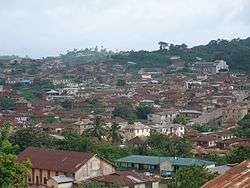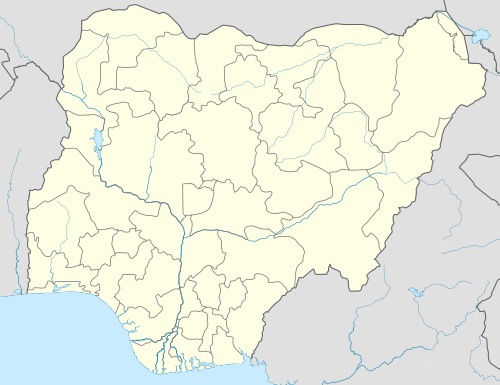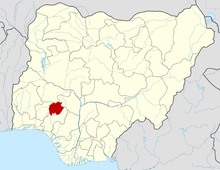Ijero Ekiti
Ijero Ekiti is a town in Ekiti State of Nigeria in West Africa. "Ijero Ekiti" refers to a common thought or mutual understanding which is situated in the northwest part of Ekiti State. Ijero Ekiti is the headquarters of Ijero Local Government since 1976. She has other component town under her control such as Ijurin Ekiti, Ikoro Ekiti, Iroko Ekiti, Ayegunle Ekiti, Ipoti Ekiti, Iloro Ekiti, Temidire Ekiti, Ilukuno Ekiti and others are Epe Ekiti, Ara Ekiti, Araromi Ekiti, Oke Oro Ekiti, and Odo Owa Ekiti. The main language spoken by the indigenes of Ijero Ekiti is Ekiti dialect and the Yoruba language.
Ijero Ekiti Ijero Ayee Olojijero | |
|---|---|
LGA and town | |
 | |
| Nickname(s): Ijero Kingdom | |
| Motto(s): Ijero e gbe a o | |
 Ijero Ekiti | |
| Coordinates: 7°49′N 5°5′E | |
| Country | |
| State | Ekiti State |
| Government | |
| • Ajero of Ijero Kingdom | HRM Ajero Oba Joseph Adebayo Adewole |
| • Local Government Chairman and the Head of the Local Government Council | Abiodun Dada |
| • Local Government Secretary | Princess Oriade Funke |
| Population (2006) | |
| • Total | 221,406 |
| Time zone | UTC+1 (WAT) |
| Website | http://www.ijeroekiti.org/ |
Ijero Ekiti coordinates in the north by 07.42.61 degree, east 00517.9 degree and her elevation is 1332. Ijero local government is bordered by Moba Local Government in the north, Ido Osi Local Government, Irepodun/Ifelodun Local Government in the east, Ekiti West in the south and Ila Orangun are in Osun State in the West and Northwest. Ijero Ekiti is about five (5) hours drive to Abuja, The Federal Capital Territory of Nigeria, also about four (4) hours drive to Lagos City Metropoly and about twenty minutes (20) minutes drive to Ado Ekiti, The Capital of Ekiti State.
With a population of 222,000 people as it was shown with the 2007 population census, Ijero Ekiti is the second largest town in the whole of Ekiti State. The Ijero local government has a largely agrarian population producing cash crops such as cocoa, kola nuts, coffee, kola, cashew, and timber. She also produces food crops such as yam, cocoyam, cassava, pepper, tomatoes, and banana. and all crops mentioned above are produced in large quantities with good qualities. Ijero Ekiti is also the seat of mineral resources such as tourmaline, colombat, vesper, and crystal stone.
Ijero Ekiti has the presence of both federal and state in the local government such as Telecommunication Center, Mobile Network Station, Power Holding Company of Nigeria (PHCN), police command, specialist hospital, factory, sawmill, bakeries, filling station (both Mega and privately owned) banks, schools (primary, secondary and tertiary institutions such as School of Health Technology, Ekiti State Cooperative College and Government Technical College Ijero Ekiti).
Ijero Ekiti is the home of culture and tradition of which our dressing has traditional value. Male dress in Buba and Sokoto with fitted cap while the female dress in Iro and Buba with Gele (head tie), the chief dresses in traditional attire and put on beads on their neck and wrist both male and female chief. Queen Abokoaye is the head queen while chief Eyegun of Ijero Ekiti is the head of female in the kingdom.
The king (Owa Ajero of Ijero Kingdom) always dress in big attire called Agbada with crown and beads on his neck and on his wrists. The queens (Olori) always dress decently with beads on their wrists and neck. They do not wear headgear instead beads are used to design headgear and this is what they wear on their head. Abokoaye is the head of all the Oloris (queens) in the whole of Ijero kingdom and she also has her throne. There is a particular ritual drum which is always beaten during Ijero cultural festival for only Abokoaye and this drum can be beaten by only a chief whose name is Chief Alugbedu from Oke-Oro, while High Chief Obanla is the second in command to Owa Ajero and Chief Egbedi is the chief security to Owa throughout the kingdom and other important Chief in the lineage.
Before the introduction of foreign religion, Ifa, Osun, Imole, Orisa nla and Ogun are the gods which our fore fathers worships in those days. Chief Olotin, Chief Esinkin, Chief Olorogun, Chief Asosanyi, Chief Egbedi, Chief Asaba, Chief Aasan and Chief Saloro are the custodian of cultural heritage in Ijero Ekiti. The chiefs mentioned are directly involved in the cultural festival. There are various cultural activities which normally takes place in the Kingdom.
Ijero contains a number of churches including Seventh-Day Adventist Church, a Catholic church, Christ Church Cathedral, Christ Apostolic Church, Redeemed Christian Church of God and Winner’s Chapel.
Literature
- Ijero Kingdom in Yoruba History by J. Wellington Alufa
- Tell Ijeroism by Femi Alufa (2003)
- Ajero Oyiyosoye and the Ekitiparapo War by Leke Oyebade


